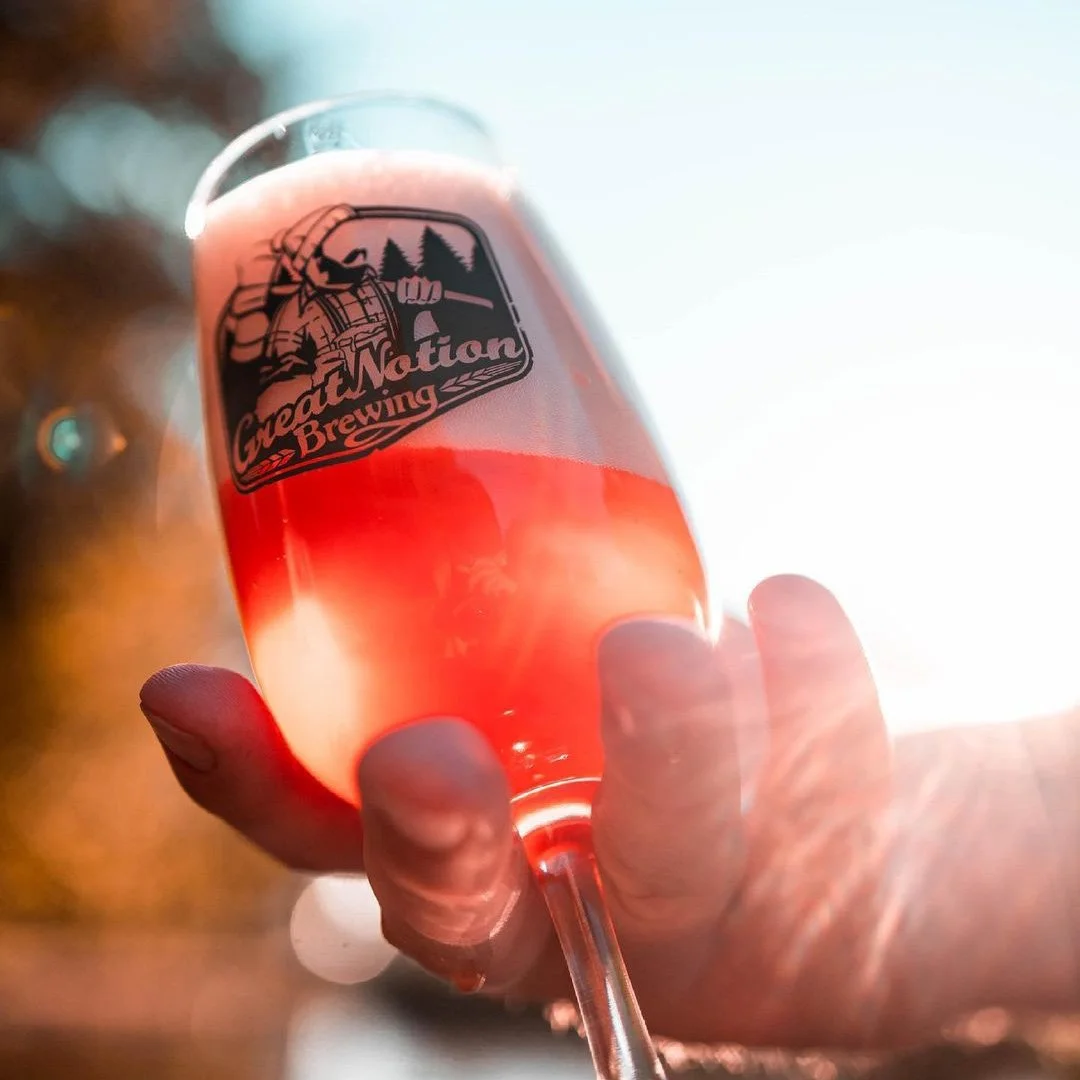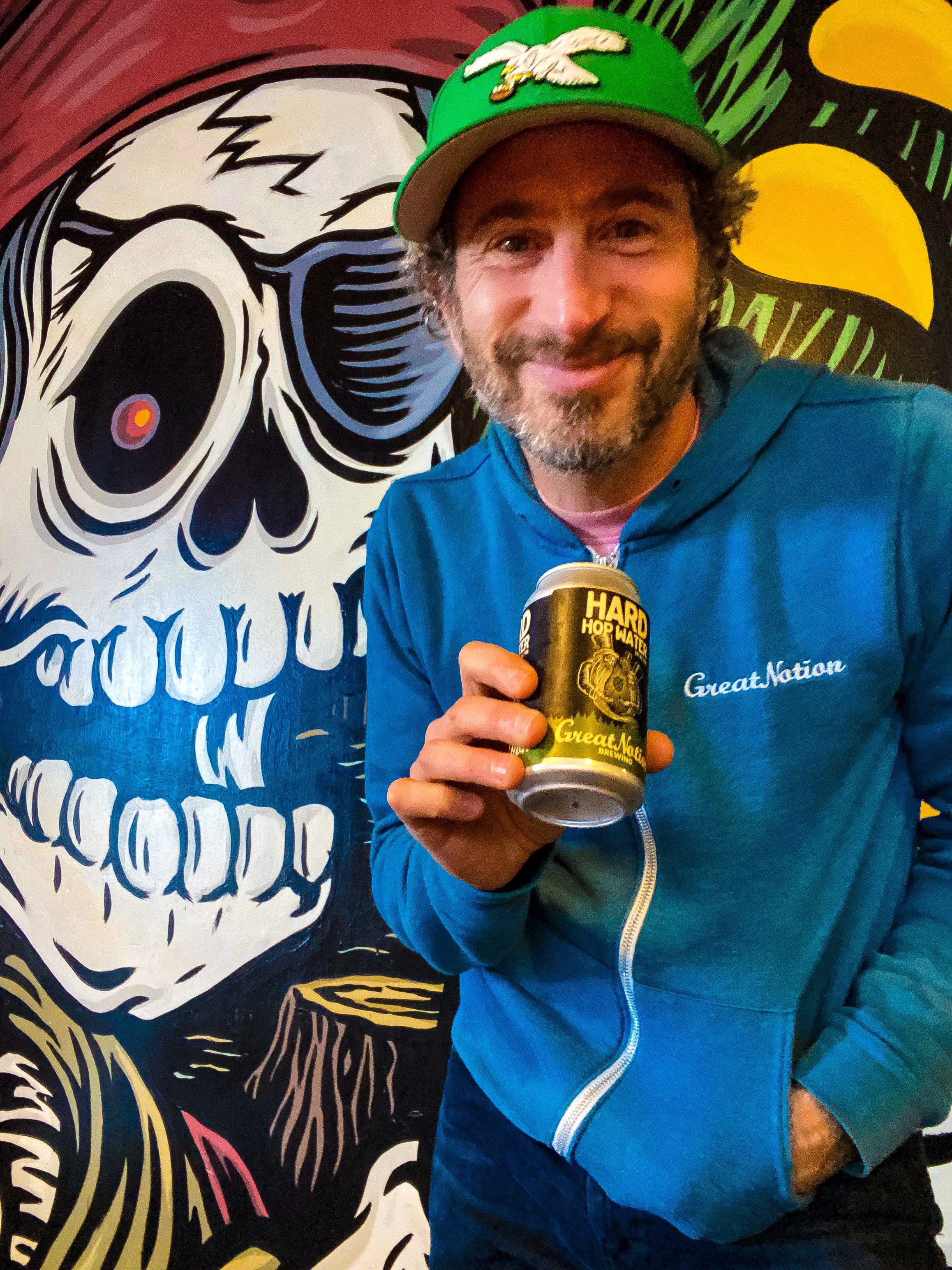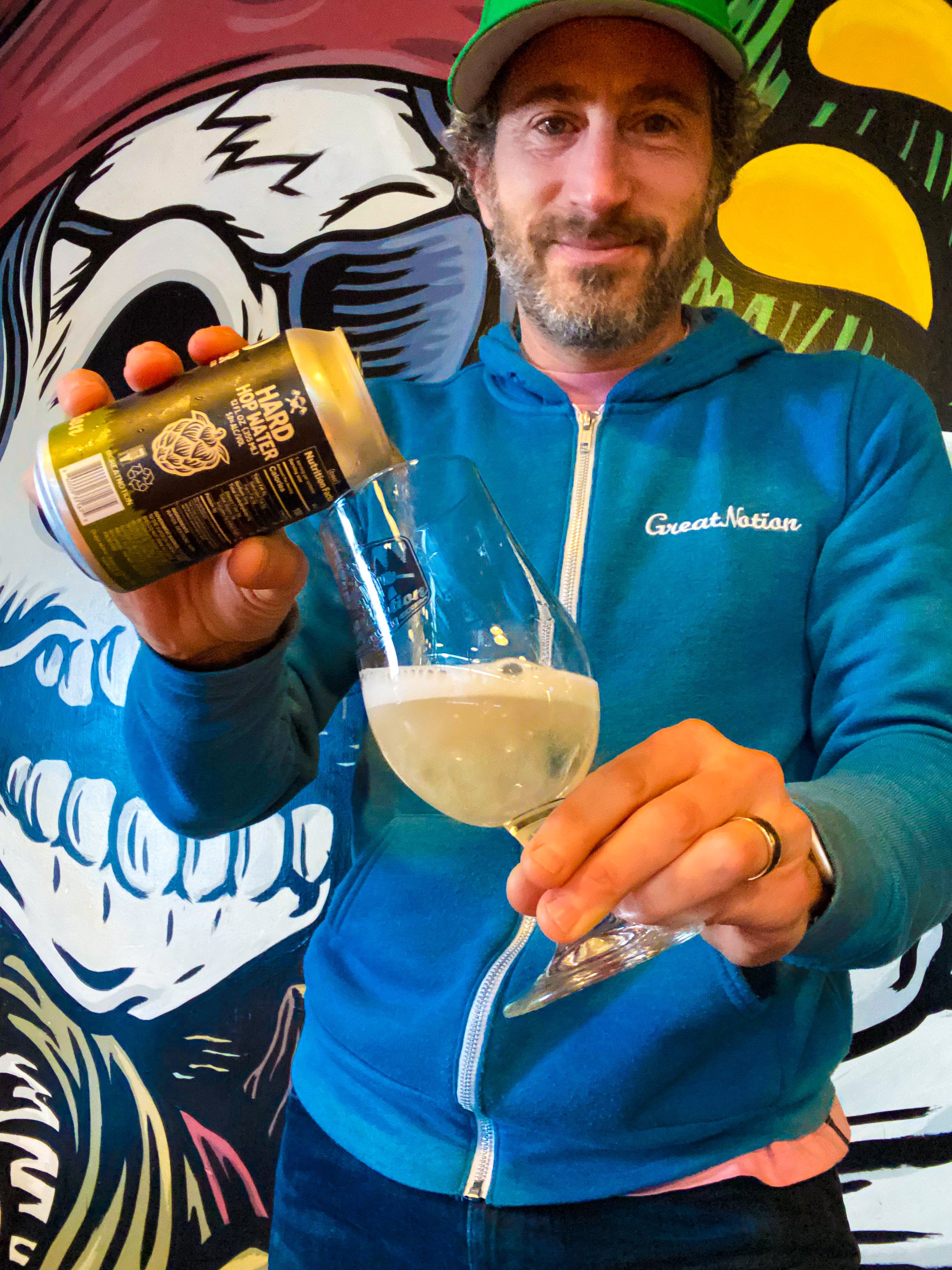Great Notion Brewing CEO’s Next Great Notion
If you need evidence that changes are afoot at Portland-based Great Notion Brewing, just take a sip of their latest innovation. Hard hop water tastes like the polar opposite of the big hazy IPAs, sweet pastry stouts, and fruit-packed kettle sours that put them on the map. In fact, it’s a major departure from all of these things and sees the once uber-hyped brewery fusing two hot trends in the adult beverage sector: hard seltzer and fizzy hop water.
For Great Notion CEO Paul Reiter, who co-founded the brewery with James Dugan and Andy Miller in 2016, the brewery’s hard hop water packed with tropical Mosaic and Citra hops and only the faintest trace of alcohol (it’s 5%) represents a larger shift to adapt their beverages to a shifting beer market. It’s a market no longer defined by beer nerds shelling out wads of cash for special one-off releases after standing in line for hours, and as a result, many breweries are simplifying their offerings while also betting on categories outside beer like seltzer and non-alcoholic options.
Great Notion Brewing CEO (photo above) Paul Reiter’s next great notion: Hard Hop Water
For many breweries, the last two years have been defined by a sometimes sharp decline in sales due to factors like over-saturation of the market, competing beverages like seltzer and ready-to-drink cocktails (RTDs), and an overall decline in alcohol consumption, especially among younger drinkers. Doing things the same old way isn’t always an effective strategy, and breweries have been forced to produce new offerings to attract customers, whether through taproom traffic and sales or off-premises such as grocery stores and bottle shops.
With their hard hop water, the Great Notion team is tackling two trends at once: hop water and hard seltzer. But beyond the obvious trendiness, Reiter is genuinely excited about hard hop water as another example of the brewery’s commitment to always pushing boundaries and being among the first to do something among their West Coast peers. His enthusiasm is palpable as he pours samples on a recent busy evening at Great Notion’s original Alberta location.
”I don’t know how or why, but I’m pretty sure we’re one of the first breweries if not the first to do a hard hop water. No one in the industry that we know of is doing a dry-hopped hard seltzer. Everyone we talk to about the concept is like, ‘dude I love hop water so why not.’ We’re super happy with it - it’s Citra and Mosaic, two hops we love the most. It’s beautiful, it’s clear, we use a carbon filter to take out any weird minerals or off flavors. It’s super crisp and we’re loving the way this turned out. We’re thinking this could be a thing.”
Though he’s quick to point out that hard hop water isn’t part of any drastic shift in Great Notion’s business strategy, Reiter also acknowledges that the product is one part of their push to drive business beyond their typical offerings and during times of year when beer drinkers might be indulging less or looking for less filling options.
“We were starting to brainstorm products for Dry January because we knew [the taprooms] would be dead. We were really happy with the non-alcoholic hop waters we made last year, and just in general, watching the trends in hop water, it’s tiering upwards big time. All of the people really like drinking them. Seltzers are kind of going down, but we really like hop water, and we were like, ‘We wish this was alcoholic because sometimes you want to have a low-calorie drink. Someone was like, ‘let’s try hard hop water.’ We’ve been at this for a long time,” he says.
Prior to the pandemic, Great Notion was the envy of the beer world with the kind of hype that stretched well past Oregon’s border and created fiends amongst the hoards of beer traders seeking to get their hands on offerings like Blueberry Muffin, Double Stack, Juicebox, and super limited barrel-aged releases. Great Notion seemed as if they were printing money as they expanded from their humble Alberta Street brewhouse to a spacious production warehouse with 30bbl brewhouse and their own canning line in 2019. When the pandemic hit and people were hoarding cans of beer like toilet paper, Great Notion innovated with an app that made it even easier to buy their beer and gave them the ability to incorporate shipping directly to consumers.
Riding high on the success, they expanded quickly as they followed the satellite taproom model that has historically seen mixed results for breweries. By 2022, you could sip Great Notion at their two Portland locations in NE and NW (and a summer pop-up in SE) as well as taprooms in Beaverton, the Ballard and Georgetown neighborhoods of Seattle, and even Berkeley, California. Then things began to change. Suddenly, those years of growth that saw nearly 10,000 craft breweries operating in the U.S. started to slump, with much of the decline driven by lower sales at taprooms and brewpubs.
“Breweries that came up when we came up and how we came up, we’re kind of in the same boat. We went big, sold tons of beer for the first couple of years of the pandemic, and then people stopped drinking every day, watching carb intake, and the younger generation [is] drinking less. We were all kind of caught a little off guard,” admits Reiter.
Reiter points to a handful of tactics that go beyond hard hop water to weather the downturn and keep people excited about Great Notion. This includes outsourcing their Alberta taproom kitchen to Matt’s BBQ Tacos and partnering with Pizza Thief to handle food at their main Northwest Portland location, which frees up the Great Notion staff to focus more on brewing beer than running a restaurant operation.
“Not running a kitchen takes a million headaches off your plate, and we can also partner with the best of the best,” says Reiter, who is now looking for someone to take over the kitchen at their Beaverton location.
For Great Notion, this has meant themed releases like putting out 13 special Halloween beers, and their annual ‘Get On The Bus’ promotion around 4/20 that includes stoner-friendly brews, plus colorful beer flights that might appeal to new, beer-curious customers.
“Taprooms for 99% of the breweries I talk to were pretty slow this summer, but distribution has been up too. I think people are drinking less beer, and there are so many other products out there. More people have been homebodies since the pandemic. You gotta have fun stuff to come out.”
The brewery is also placing a larger focus on distribution and specifically getting more budget-friendly beers into larger retailers like grocery stores, which is a major pivot from previously focusing on in-house sales and direct consumer shipping. Reiter is hoping that offering products like hard hop water (their first in a 12 ounce can) will help, as well as a hazy called Northleft and a West Coast IPA called Easy Lift that come in at a lower price point than their other beers.
“Northleft is kind of like Ripe’s little brother; it’s hella tasty and more approachable to your stomach and your wallet. I say that because you can crush three of them. Hopefully, it shows up in Fred Meyer for about $16 a four-pack. We want it to sit next to a Breakside and be in the same price range,” says Reiter. “What we’re focused on these days is controlling costs and trying to make some profitable beers. I know people are going to take that the wrong way. Making a triple dry-hopped hazy IPA is not a profitable beer to make even if you charge $25 a four-pack if you have taprooms and pay your employees well and give them good benefits, which we do. So that’s why we have to find a way to make some beers that also have good [profit].”
He is quick to add that the brewery is “still trying to innovate” and is mostly expanding and diversifying their offerings rather than scaling back. Reiter is optimistic that innovations like hard hop water that diversify their offerings will grab the attention of younger consumers looking for lower alcohol and less caloric options that may fit better into a wellness-inspired lifestyle. Great Notion has even launched non-alcoholic hop water riffs on some of their famous beers like Ripe and Over Ripe.
Times are tough for the beer industry as a whole, but the players who can successfully balance innovation and consistency while maintaining and even growing brand loyalty will be poised for success.
“We’re like an awkward teenage business, we still have lots of followers and fans, but it’s a weird time and we’re just trying to see what’s in store for the next decade. One of the strategies over the next 12 months is streamlining our business. These days people want more consistency - you can see that with all of the cheap cool lagers. We’re trying to do more consistent beers like that,” says Reiter.
As Great Notion approaches its 9th anniversary, Reiter and his team are learning how to be a more versatile business while still keeping their fans excited. They’ve cranked out around 12,000 barrels the last couple of years and he hopes to hit 15k by the time they reach a decade.
“For years, we were the hype brewery, making a lot of money and spending it, but you gotta look at your costs. If you want to last for a decade, eventually you have to be a smart business person. Beer isn’t going anywhere, it’s not going to die, it’ll come back no matter what. We’re not going to deviate too much from making the best beer we can.”










